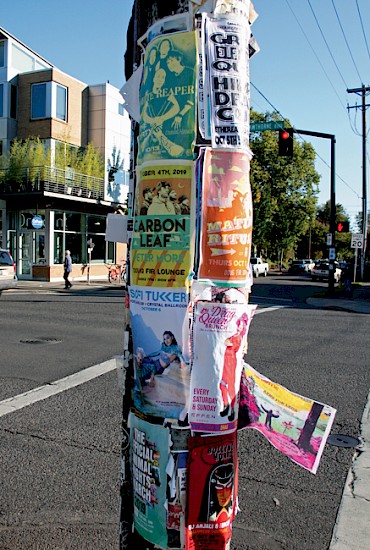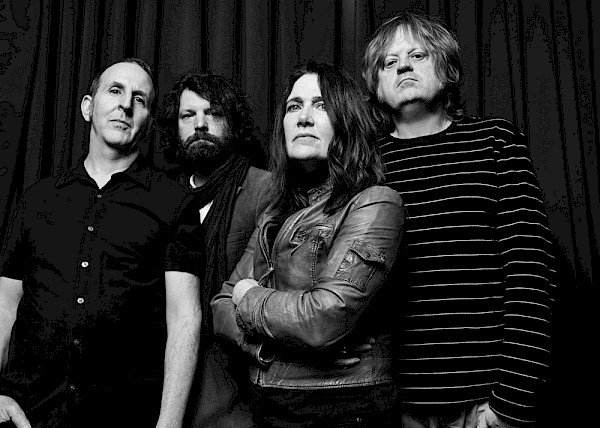 Lately, I’ve been wondering what it would be like to be a musician with no social media presence. Considering Portland’s show poster- and flyer-covered streets and lamp posts, I’m sure I’m not the only millennial who daydreams about an offline, underground music industry. Many musicians can attest to the amount of online and social media work it takes to keep a band “relevant.” And with ever-increasing pressure from the mainstream music industry to not only develop an image, but to deliver a story and a character to follow via Instagram, Twitter and Facebook, it’s no wonder many musicians feel like they need to be marketing agents first and musicians second.
Lately, I’ve been wondering what it would be like to be a musician with no social media presence. Considering Portland’s show poster- and flyer-covered streets and lamp posts, I’m sure I’m not the only millennial who daydreams about an offline, underground music industry. Many musicians can attest to the amount of online and social media work it takes to keep a band “relevant.” And with ever-increasing pressure from the mainstream music industry to not only develop an image, but to deliver a story and a character to follow via Instagram, Twitter and Facebook, it’s no wonder many musicians feel like they need to be marketing agents first and musicians second.
I’m no luddite. Social media is a great tool to get the word out about your band, but I’ve always been fascinated by bands who began pre-social media and continue to have an impact on their local scenes, still with little to no online presence.
One such band is the Seattle-based, Portland-frequenting Kinski. Having recently celebrated their 20th year as a band and the re-release of their 2001 record Be Gentle with the Warm Turtle on Kill Rock Stars (listen below), they formed on the basis of experimenting with the musical waters in ’90s dive bars. Since their first show in 1999, they’ve toured with Acid Mothers Temple, Oneida, Comets on Fire and Tool.
I got to chat with Chris Martin, co-founding member and guitarist, about Kinski’s early days and his take on the influence social media has had on bands.
Some bands form with the idea that they’ll try to “make it.” Other bands get together because they’re excited about the synergy between the players and the artistic satisfaction they get from that. What was the original intention of forming Kinski?
My original intention was to just try and play a style of music that I loved. Not try to get signed or any of the other BS. I think if you’re really trying to “make it,” people can see through it. And you really better have the songs or the vibe to back it up.
In the band’s pre-Facebook and Instagram days, how did you first start getting the word out about your shows?
In the old days, it was mostly putting up flyers on poles. After my earlier bands, I swore to myself that I would never put up flyers again. I hated postering so much. It’s hard to believe that that used to be one of the only ways to get people to know about your shows.
I thought email lists were really great. I still send out an email to the old-school people. That way was so pure and simple, and of course, it got co-opted and turned into a profit thing by Facebook and the like.
 Kinski: Photo by Steven DewallIt’s common now for musicians to post “stories” of shows they’re playing and behind-the-scenes bits. Do you think there’s something to be said about leaving the show a mystery that you only get to experience if you’re there?
Kinski: Photo by Steven DewallIt’s common now for musicians to post “stories” of shows they’re playing and behind-the-scenes bits. Do you think there’s something to be said about leaving the show a mystery that you only get to experience if you’re there?
Yeah, I think the mystery thing is still important. I have to say that, for me personally, I find that a lot of times when I’m checking out a new band online, it keeps me from going to the show! If they have some crappy-sounding tracks on Bandcamp or a terrible-sounding YouTube clip, I don’t end up going to check them out live.
It seems like bands these days form and then within the first year, before they’ve even released anything, have 2,000-plus social media followers, somehow bypassing the grueling (but fun) days of working to get your band out there. Over the years, have you seen a change in the way bands present themselves?
I think it would be best for people to ignore social media until you’ve made something that really needs to be promoted. Too much chatter out there!
• • •
What I take away from talking with Martin, and considering the impact of the monetized internet combined with the pressure of social media presence, is that at one point artists were not expected to be “on” all the time. In fact, in most cases artists are often more withdrawn, more private than the A&R teams and label representatives.
As artists, it’s incredible we have tools at our fingertips to promote ourselves, but there must be a balance between constant DIY promotion and the private life of a creative person who writes because they have something to say. Let’s not forget what we’re promoting and why.
Olivia Awbrey is a songwriter, multi-instrumentalist and writer from Portland.




